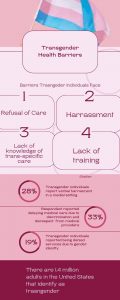
"In many medical encounters, I have found myself in the educator's position. There is a clear lack of training for healthcare personnel regarding transgender patients, and treatments pertaining to transitioning. While I have no qualms about providing very detailed responses to healthcare workers, I am alarmed at the frequency this happens. As a transgender individual, trying to find a primary healthcare provider can be extremely challenging. I called 5 different doctor's offices before I found a doctor that would accept me as a patient. I saw them 4 times (2 years) and then they retired. The only other provider that would see me after that was an APN (advanced practice nurse) working under a Doctor that wouldn't see me themselves, but "agreed to let the APN see me". The APN admitted during our first appointment that she had "no experience in this area, but was willing to try it out". That was certainly reassuring. But I stuck with her, and I have been able to give her the "Intel" to help other transgender patients and provide a better standard of service to our rural area. I was told by 3 different gynecologists that they wouldn't see transgender patients, one stating, "we don't do that kind of thing here". As a transman who is married to a cisgender female, I was once asked during a health screening if I was using condoms during intercourse. I then had to explain the mechanics of sexual intercourse between a pre-op transgender male and cisgender female individuals to two nurses, and explain why male condoms were not necessary...I had to use hand gestures. While I do have a very good sense of humor, I look forward to a day where I don't have to worry about my standard of care being a transgender individual."
Alex Socorro
According to the Williams Institute, there are an estimated 1.4 million U.S. adults that identify as transgender.18 However, determining the true population of gender minority groups is difficult due to transgender individuals’ concerns with being identified due to discrimination.3 These concerns are amplified by transphobia in many areas of the United States. Transgender individuals face multiple forms of discrimination, stigma, psychological abuse, physical abuse, bullying, and economic alienation.1,8,11 Transphobia influences societal and economic marginalization and can negatively impact the health status of the transgender population.2,6,8 Also, the transgender population faces a high prevalence of anxiety, depression, eating disorders, social phobia, and psychological distress.11,13 Furthermore, transgender individuals also face verbal, physical, and sexual violence.5,9,12,14 Transgender individuals also suffer from higher mortality and morbidity rates compared to heterosexual individuals.6 Compared to heterosexual, cisgender males and females, transgender individuals are more likely to commit suicide.9
Transgender individuals face barriers to transgender-specific health care, such as refusal of care from medical care providers, harassment in the medical setting, or lack of knowledge of trans-specific health among medical care providers.5,6,15 According to the National Transgender Discrimination Survey, 33% of respondents reported delaying medical care due to discrimination and disrespect from medical providers, 28% reported verbal harassment in a medical setting, and 19% reported being denied services due to their gender identity.6
Provider-based barriers to treating transgender individuals may be due to the lack of knowledge or lack of confidence of transgender-specific health care. These barriers may arise from lack of exposure to transgender patients or lack of training among medical professionals.17 Other barriers providers face is the lack of training in trans-specific care or lack of insurance coverage for trans individuals.7,15,17 In the National Transgender Discrimination Survey, transgender individuals reported being less likely to have health insurance, either individually or through an employer.6 Even if transgender individuals have insurance, insurance companies routinely deny coverage of transition-related health care.15 Transgender individuals have thus had to find loopholes in insurance policies to get trans-specific services covered.15

Due to provider-based barriers and discrimination transgender individuals face, the transgender populations are faced with several health disparities. This blog calls for:
BCPHR.org was designed by ComputerAlly.com.
Visit BCPHR‘s publisher, the Boston Congress of Public Health (BCPH).
Email [email protected] for more information.
Click below to make a tax-deductible donation supporting the educational initiatives of the Boston Congress of Public Health, publisher of BCPHR.![]()
© 2025-2026 Boston Congress of Public Health (BCPHR): An Academic, Peer-Reviewed Journal
All Boston Congress of Public Health (BCPH) branding and content, including logos, program and award names, and materials, are the property of BCPH and trademarked as such. BCPHR articles are published under Open Access license CC BY. All BCPHR branding falls under BCPH.
Use of BCPH content requires explicit, written permission.